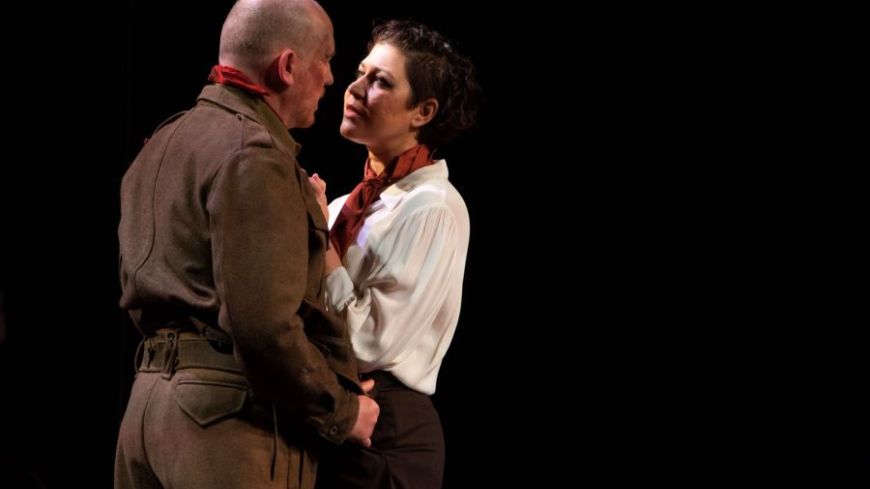
The pure art of live theatre, actors performing a play, again and again, is the name of the game here, Carlin explains in a prologue to us, the audience of ‘misery seekers … ghouls.’ On this empty stage of bare boards, ‘the story will be told .. the hags on the heath, a woman who went mad, the man who became a tyrant’.
This fresh, feisty, feminist 20th century version by Zinnie Harris explores the dark, subversive mindset of Lady Macbeth in contrast to the guilt-ridden undoing of Macbeth. Selected, essential extracts of Shakespeare’s dialogue are smoothly blended with colloquial conversation, sardonic wit and gallows humour.
We first meet Lady Macbeth, dressed in tailored shirt and Oxford trousers, reading a letter from her husband, now Thane of Cawdor, and given the prophecy of ‘King that thou shalt be’. With news of Duncan’s imminent arrival, she pleads with the spirits to ‘unsex me here and fill me top full of direst cruelty,’ desperate in her ambition for regal status and power.
In a series of intimate, whispered scenes, she uses passionate kisses and feminine guile to persuade Macbeth to agree to her monstrous plan - ‘We can do this,’ she assures him. While he hesitates, she calmly orders the cook to ‘slaughter two dozen ducks’ for dinner.
Picture a glamorous 1930s party, a celebratory ‘brouhaha’ to welcome King Duncan, the (heavily pregnant) Lady Macduff, Malcolm, Banquo, Ross and courtiers – silk evening gowns, black tie and tails, jazz music, cocktails. (The period setting, perhaps unwittingly, transforms Macbeth’s Castle into a grand Country House, fit for an Agatha Christie murder mystery, akin to ‘The Mousetrap’).
The deed is done but Macbeth is haunted by ghosts and voices, unable to sleep. Explaining that he is just 'temporarily indisposed', the Queen takes control, sits at his desk to deal with state affairs, her gender-bending, masculine authority leading Ross to address her as the King.
As the beautiful, elegant, Lady Macbeth, Nicole Cooper portrays her dissociative personality with heartless, cool, Ice-Queen conviction, hiding behind a mask while deftly switching from vivacious hostess to violent murderer. Likewise, Adam Best plays the treacherous Macbeth with quiet vulnerability, rapidly falling from grace - the brave war hero to tortured soul.
Carlin, an ad hoc narrator of the story from her point of view, is the housekeeper (like Mrs Danvers in ‘Rebecca’) – hovering in the wings, listening, observing. The three weird witches hide in plain sight as servants, Carlin, Missy and Mae (perhaps mother, daughter and grand-daughter), a threatening, supernatural presence. Fluttering birds in the rafters, the sudden shriek of an owl, the cry of a raven and the insistent knock, knock, knocking on the door, all add to the eerie atmosphere through a swirl of mist.
What is rather distracting is the curious range of accents from RP English to Irish and working class Glaswegian with no connection to aristocratic class or Princely status. Also slight confusion through doubling of several roles, with little change of character other than simply donning a beanie hat.
Zinnie Harris directs with a dagger-sharp, film maker’s vision through soft lighting, music, sound effects, glass screens and flowing drapes, scene by scene. Most impressive is the gracefully choreographed ballroom dancing and the procession of King and Queen dressed in ornate gold braided, white costumes. The colour white is a recurring symbol; with a touch of magical stagecraft, Lady Macbeth’s white dresses are repeatedly stained with spots of red blood – but is this just her imagination, revealing her guilty conscience?
‘No man of woman born can harm Macbeth’ always gives the King hope of escape but beware of a very clever, final, fateful twist in the plot. The tragic undoing of Macbeth and his Queen is retold for our times with literary intellect, pace and passion as a chilling, brutal, blood-thirsty theatrical spectacle.
Show times:
4 – 25 February.
Evenings, 7.30pm. Wednesday and Saturday matinee, 2.30pm. (not Mondays).
Ticket prices, £18 - £42.

